新外研版七年级英语下册(全套)知识点汇总语法知识汇总
外研版英语七年级下册各单元知识点汇总
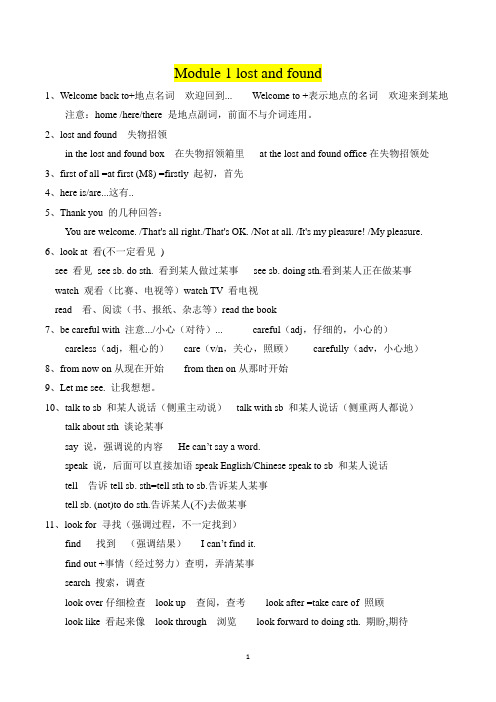
Module 1 lost and found1、Welcome back to+地点名词欢迎回到... Welcome to +表示地点的名词欢迎来到某地注意:home /here/there 是地点副词,前面不与介词连用。
2、lost and found 失物招领in the lost and found box 在失物招领箱里at the lost and found office在失物招领处3、first of all =at first (M8) =firstly 起初,首先4、here is/are...这有..5、Thank you 的几种回答:You are welcome. /That's all right./That's OK. /Not at all. /It's my pleasure! /My pleasure.6、look at 看(不一定看见)see 看见see sb. do sth. 看到某人做过某事see sb. doing sth.看到某人正在做某事watch 观看(比赛、电视等)watch TV 看电视read 看、阅读(书、报纸、杂志等)read the book7、be careful with 注意.../小心(对待)... careful(adj,仔细的,小心的)careless(adj,粗心的)care(v/n,关心,照顾)carefully(adv,小心地)8、from now on从现在开始from then on从那时开始9、Let me see. 让我想想。
10、talk to sb 和某人说话(侧重主动说)talk with sb 和某人说话(侧重两人都说)talk about sth 谈论某事say 说,强调说的内容He can’t say a word.speak 说,后面可以直接加语speak English/Chinese speak to sb 和某人说话tell 告诉tell sb. sth=tell sth to sb.告诉某人某事tell sb. (not)to do sth.告诉某人(不)去做某事11、look for 寻找(强调过程,不一定找到)find 找到(强调结果)I can’t find it.find out +事情(经过努力)查明,弄清某事search 搜索,调查look over仔细检查look up 查阅,查考look after =take care of 照顾look like 看起来像look through 浏览look forward to doing sth. 期盼,期待12、get on/off the bus 上/下公交车get in/out of the car 上/下小车13、in a hurry 匆匆忙忙hurry up=come on 快点儿,赶紧hurry to do sth 匆忙去做某事(there’s)no hurry 不忙,不必着急P8314、every day 每天时间状语everyday 每天的,日常的(形容词,后面接名词)15、many other things 许多其他的东西16、at the/ this moment=now此时此刻,现在at that moment=then 在那时17、a lot of =lots of =some许多既可以修饰可数名词,也可以修饰不可数名词。
外研版七年级英语下册各模块语法知识汇总+专项练习

外研版七年级英语下册各模块语法知识汇总+专项练习M1 形容词性和名词性物主代词专项练物主代词分为两种:形容词性物主代词和名词性物主代词。
形容词性物主代词不能单独使用,后面必须跟名词,例如:We are doing our XXX(我们正在做家庭作业。
)名词性物主代词则具有名词的性质,可以单独使用,例如:My shirt is black。
but yours is white.(我的衬衫是黑色的,但你的是白色的。
)名词性物主代词也可以具有“形容词性物主代词+名词”的作用,例如:Whose comb is it。
It’s hers.(hers=her+comb)下面是物主代词的对照表:物主代词 | 形容词性 | 名词性 |我的 | my | XXX |你的 | your | yours |他的 | his | his |她的 | her | hers |它的 | its | its |我们的 | our | ours |你们的 | your | yours |他们的 | their | theirs |需要注意的是,名词性物主代词可指一件东西,也可指很多件东西,需要根据上下文来决定。
例如:选择填空:1.This is my teapot。
It’s not __________。
(your/ yours)2.My hairdryer is on the desk。
Where’s ____________?(her/ hers)3.___________ hairdryer is not on the table。
___________ is there。
(Her/ Mine)4.Whose calculator is it?It’s __________。
It’s __________ XXX)5.Are they ___________ (your/ yours) combs。
Yes。
they’re _________(our/ ours).用所给词的适当形式填空:1.That is not _________ kite。
外研版七年级下册英语重点知识点汇总
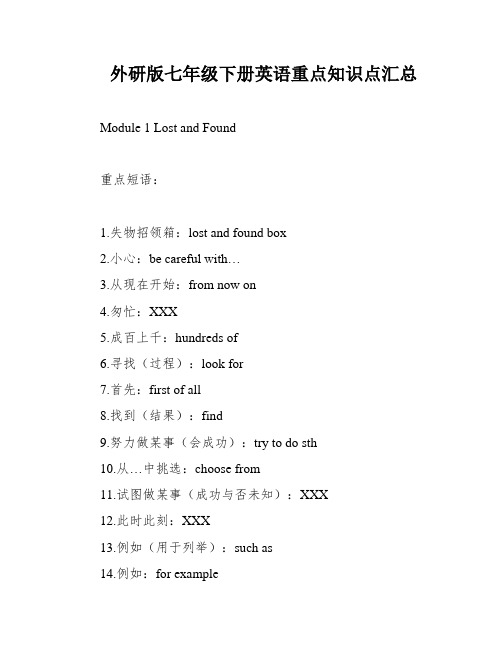
外研版七年级下册英语重点知识点汇总Module 1 Lost and Found重点短语:1.失物招领箱:lost and found box2.小心:be careful with…3.从现在开始:from now on4.匆忙:XXX5.成百上千:hundreds of6.寻找(过程):look for7.首先:first of all8.找到(结果):find9.努力做某事(会成功):try to do sth10.从…中挑选:choose from11.试图做某事(成功与否未知):XXX12.此时此刻:XXX13.例如(用于列举):such as14.例如:for example重点句型:1.这是谁的 (XXX)2.帮助某人做某事:help sb do XXX.3.请小心保管…:XXX…4.欢迎来到…:e to +地点5.给某人打call sb at +电话号码语法总结:物主代词:表示所属关系的代词(…属于谁的)单数:人称形容词性物主代词名词性物主代词第一人称 my XXX第二人称 your yours第三人称 his hers its复数形容词性物主代名词性物主代第一人称 our ours第二人称 your yours第三人称 their theirs形容词性物主代词:必须和名词在一起,例如XXX,your XXX…名词性物主代词:相当于与之相对应的形容词性物主代词+名词,例如XXX.Module 2 What Can You Do?重点短语:1.与某人相处融洽:get on well with sb.2.弹钢琴:play the piano3.打乒乓球:play table XXX4.…怎么样?=how about…。
what about…5.担心…:XXX…6.擅长做某事:be good at doing sth.7.放风筝:fly a kite重点句型:无语法总结:无2.high-tech高科技的3.XXX虚拟现实4.XXX机器人仆人5.XXX太空旅行6.XXX可再生能源7.self-driving cars自动驾驶汽车8.ic engineering基因工程9.XXX寿命10.artificial intelligence人工智能重点句型】1.In the future。
外研版英语(新标准)七年级下册模块知识点归纳总结(全册)
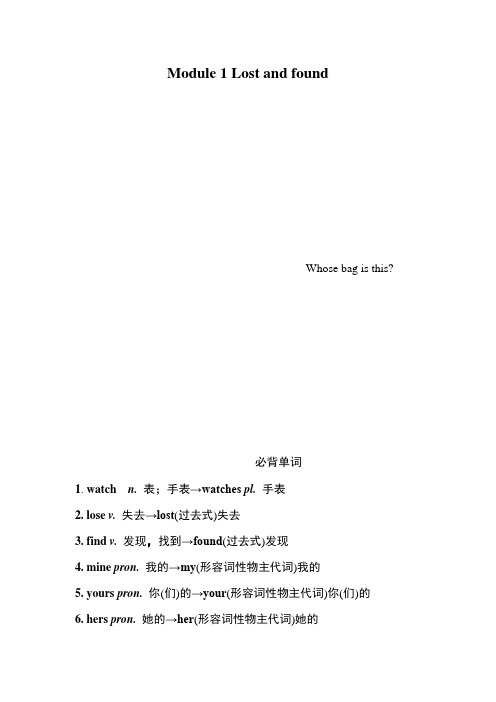
Module 1 Lost and foundWhose bag is this?必背单词1. watch n.表;手表→watches pl.手表2. lose v.失去→lost(过去式)失去3. find v.发现,找到→found(过去式)发现4. mine pron.我的→my(形容词性物主代词)我的5. yours pron.你(们)的→your(形容词性物主代词)你(们)的6. hers pron.她的→her(形容词性物主代词)她的7. careful adj.仔细的;认真的;小心的→carefully adv.仔细地;认真地;小心地8. crayon n. 蜡笔9. eraser n. 橡皮擦10. glove n. 手套11. wallet n. 钱包12. whose pron. 谁的13. tape n. 录音带;录像带14. purple adj. 紫色的;紫红色的;n. 紫色;紫红色必背短语15. first of all 首先,第一16. look at 看17. be careful with 小心(对待)……18. from now on 从现在开始19. a lot of 许多,大量20. lost and found box 失物招领箱必背句子21. Welcome back to school, everyone!欢迎大家返校!22. Whose bag is this?这是谁的书包?23. Here's a purple wallet!这里有一个紫色的钱包!24. Let me see...让我看看……Are they yours?必背单词1. leave v.丢下;遗忘→left(过去式)丢下;遗忘2. strange adj.奇怪的→stranger n.陌生人3. camera n. 照相机4. phone n. 电话;电话机5. plane n. 飞机6. taxi n. 出租车7. why adv. 为什么8. airport n. 机场;航空港9. hundred num. 百10. thousand num. 千11. boat n. 船12. duck n. 鸭13. pig n. 猪14. sausage n. 香肠;腊肠必背短语15. mobile phone 移动电话;手机16. lost and found office 失物招领处17. in a hurry 匆匆忙忙18. hundreds of 几百;成百上千19. look for 寻找20. at the moment 目前;此时必背句子21. Welcome to the New York City Lost and found office.欢迎来到纽约市的失物招领处。
新外研版七年级英语下知识点总结
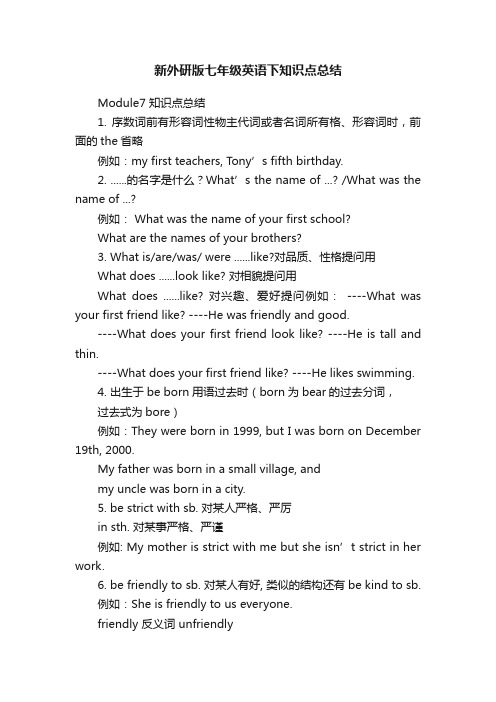
新外研版七年级英语下知识点总结Module7 知识点总结1. 序数词前有形容词性物主代词或者名词所有格、形容词时,前面的the省略例如:my first teachers, Tony’s fifth birthday.2. ......的名字是什么?What’s the name of ...? /What was the name of ...?例如: What was the name of your first school?What are the names of your brothers?3. What is/are/was/ were ......like?对品质、性格提问用What does ......look like? 对相貌提问用What does ......like? 对兴趣、爱好提问例如:----What was your first friend like? ----He was friendly and good.----What does your first friend look like? ----He is tall and thin.----What does your first friend like? ----He likes swimming.4. 出生于be born用语过去时(born为bear的过去分词,过去式为bore)例如:They were born in 1999, but I was born on December 19th, 2000.My father was born in a small village, andmy uncle was born in a city.5. be strict with sb. 对某人严格、严厉in sth. 对某事严格、严谨例如: My mother is strict with me but she isn’t strict in her work.6. be friendly to sb. 对某人有好, 类似的结构还有be kind to sb.例如:She is friendly to us everyone.friendly 反义词 unfriendly以ly结尾的形容词还有,lovely,lonely,ugly,silly,weekly,monthly,等等7. (a) very adj./adv.(原形) + n.太....,非常....,很..... quite( a/ an)+ adj./adv.(原形) + n.so+ adj./adv.(原形) +that +从句译为:如此…以至于too adj. to do sth. 译为:太……而不能例如: a very big watermelonquite a big watermelonThe watermelon is so big that I can’t eat it all.The watermelon is too big to be eaten.8. past 与pass的区别past 为介词,副词,形容词,如:(1). go past the hospital and turn left.(2). They are talking about past life. (3). It’s ten past four.而pass为动词,如: Please pass me the pen.The police car passed slowly.9. “在某地有……要做”用句型there is/are/was/were +sth.+to do…例如:There were a lot of things to do in Quincy.There are lots of interesting places to visit in Tianjin.表示“某人有某事要做”用have/has sth. to do例如: They had many things to do, and I have lots of books to read.10. one of + 名词复数表示“……中之一” One of my dear friends is a police.two of /some of/ many of/ most of……one of + the+最高级+名词复数例如:The Yangtze River is one of the longest rivers in China.Most of the people in this room are over forty.11. ……there was a big garden with lots of trees and therewas a small lake with many fish in it.with 的用法总结with用法归纳(1)“用……”表示使用工具,手段等。
最新外研版英语七年级下册知识点总结
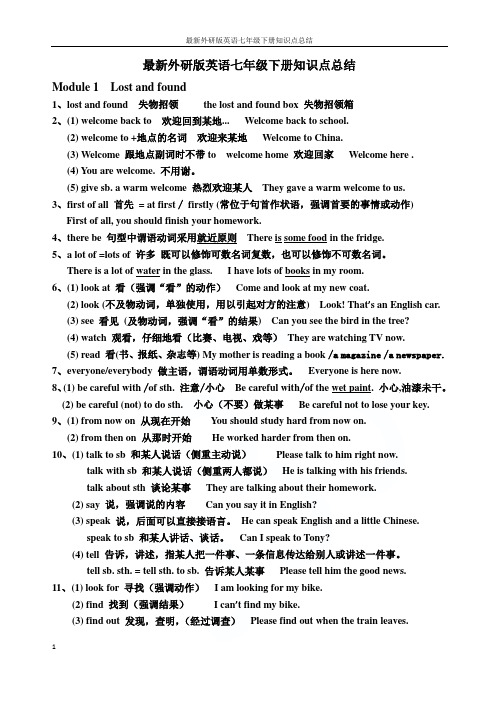
最新外研版英语七年级下册知识点总结Module 1 Lost and found1、lost and found 失物招领the lost and found box 失物招领箱2、(1) welcome back to 欢迎回到某地... Welcome back to school.(2) welcome to +地点的名词欢迎来某地Welcome to China.(3) Welcome 跟地点副词时不带to welcome home 欢迎回家Welcome here .(4) You are welcome. 不用谢。
(5) give sb. a warm welcome 热烈欢迎某人They gave a warm welcome to us.3、first of all 首先= at first / firstly (常位于句首作状语,强调首要的事情或动作)First of all, you should finish your homework.4、there be 句型中谓语动词采用就近原则There is some food in the fridge.5、a lot of =lots of 许多既可以修饰可数名词复数,也可以修饰不可数名词。
There is a lot of water in the glass. I have lots of books in my room.6、(1) look at 看(强调“看”的动作)Come and look at my new coat.(2) look (不及物动词,单独使用,用以引起对方的注意) Look! That’s an English car.(3) see 看见(及物动词,强调“看”的结果) Can you see the bird in the tree?(4) watch 观看,仔细地看(比赛、电视、戏等)They are watching TV now.(5) read 看(书、报纸、杂志等) My mother is reading a book /a magazine /a newspaper.7、everyone/everybody 做主语,谓语动词用单数形式。
外研版七年级下册英语知识点归纳
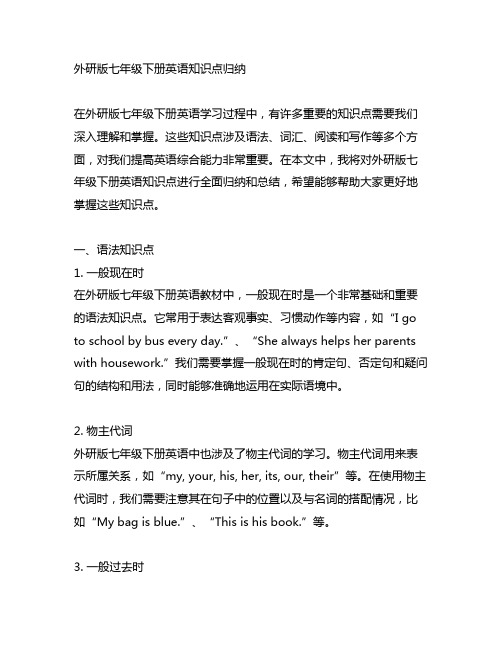
外研版七年级下册英语知识点归纳在外研版七年级下册英语学习过程中,有许多重要的知识点需要我们深入理解和掌握。
这些知识点涉及语法、词汇、阅读和写作等多个方面,对我们提高英语综合能力非常重要。
在本文中,我将对外研版七年级下册英语知识点进行全面归纳和总结,希望能够帮助大家更好地掌握这些知识点。
一、语法知识点1. 一般现在时在外研版七年级下册英语教材中,一般现在时是一个非常基础和重要的语法知识点。
它常用于表达客观事实、习惯动作等内容,如“I go to school by bus every day.”、“She always helps her parents with housework.”我们需要掌握一般现在时的肯定句、否定句和疑问句的结构和用法,同时能够准确地运用在实际语境中。
2. 物主代词外研版七年级下册英语中也涉及了物主代词的学习。
物主代词用来表示所属关系,如“my, your, his, her, its, our, their”等。
在使用物主代词时,我们需要注意其在句子中的位置以及与名词的搭配情况,比如“My bag is blue.”、“This is his book.”等。
3. 一般过去时另外,一般过去时也是外研版七年级下册英语中一个重要的语法知识点。
一般过去时用来表示过去发生的动作或状态,常常与表示过去的时间状语连用,如“last week, yesterday”等。
我们需要掌握一般过去时的构成和用法,能够正确地运用在句子中。
二、词汇知识点1. 数词外研版七年级下册英语中还包括了数词的学习。
数词用来表示数量,有基数词和序数词之分,如“one, two, three, first, second, third”等。
在学习数词时,我们需要注意其在句子中的位置和用法,同时能够正确地读写和运用。
2. 表示时间的词汇除了数词,还有一些表示时间的词汇也是我们需要掌握的,比如“week, month, year, hour, minute, second”等。
七年级下册外研社知识点

七年级下册外研社知识点七年级下册外研社教材是初中英语教材中的一部分,主要包括语法、阅读、写作、听力和口语等多个方面的知识点。
下面将分别介绍这些知识点的相关内容。
一、语法知识点1.单数第三人称单数第三人称指的是以“he/she/it”作为主语的时候,动词的变化形式。
一般情况下,动词在单数第三人称时需要加上“-s”或者“-es”。
例如:He reads books every day. She brushes her teeth twice a day.2.一般现在时一般现在时是指描述现在正在进行或者习惯性发生的事情。
在描述动作的时候,要注意主语、谓语以及时间等元素的搭配。
例如:I usually get up at 6:30 in the morning. He often goes to the park with his friends.3.名词的复数形式一般情况下,名词的复数形式在末尾加上“-s”或者“-es”。
但是,也有一些特殊的名词需要按照不同规则进行复数变化。
例如:child—children, foot—feet, tooth—teeth等。
二、阅读知识点1.推理判断阅读理解中的推理判断是指通过文章中的信息以及自己的知识和常识来进行推断和判断。
在进行推测的时候,要根据文章的细节和线索来确定答案。
例如:根据文章中的描述和“most people think”这个词组,可以推测出某个问题的答案。
2.对话理解对话理解是指通过对文章中对话的理解来回答问题。
在进行对话理解的时候,要注意对话中人物的身份、关系以及他们所表达的含义和态度等信息。
例如:根据一段对话中的表述,可以推断出讲话者想要表达的意思。
三、写作知识点1.书信格式书信格式包括信头、称呼、正文、结尾和署名等几个要素。
在书写书信的时候,要根据信件的类型来选择不同的格式,包括正式和非正式等。
例如:正式信件需要使用较为规范的格式,而非正式信件可以根据自己的口味进行自由发挥。
- 1、下载文档前请自行甄别文档内容的完整性,平台不提供额外的编辑、内容补充、找答案等附加服务。
- 2、"仅部分预览"的文档,不可在线预览部分如存在完整性等问题,可反馈申请退款(可完整预览的文档不适用该条件!)。
- 3、如文档侵犯您的权益,请联系客服反馈,我们会尽快为您处理(人工客服工作时间:9:00-18:30)。
(共12套73页)新外研版七年级英语下册(全册)知识点汇总语法知识汇总Module 1 Lost and found语法精选1. whose 谁的whose意为“谁的”, 是表示所有关系的疑问词。
其用法如下:(1)可以用来对名词所有格或形容词性物主代词进行提问。
如:This is Tina’s/her hat.→Whose hat is this?(2)可以用来对名词性物主代词进行提问。
如:These pencils are mine.→Whose are these pencils?2. hundred与hundreds ofhundred是一个确数, 表示“一百”;hundreds of是一个概数, 表示“好几百的;许许多多的”。
当 hundred前面有一个具体的数词时, hundred不变为复数。
如:①two hundred cows两百头奶牛②Hundreds of people come here ev ery day.每天都有许多人到这里来。
注意:当hundred与of连用时, 它后面的名词和它本身都用复数。
如:hundreds of cows 几百头奶牛3. such as 比如;例如such as意为“比如;例如”, 用于引出多个例子。
如:I like some animals such as lions and monkeys. 我喜欢一些动物, 比如狮子和猴子。
注意:for example也意为“比如;例如”, 用来举例说明某一论点或情况, 一般只举同类人或物中的“一个”为例, 作插入语, 可位于句首、句中或句末。
如:①For example, air is invisible.例如, 空气是看不见的。
②He, for example, is a good student.例如, 他就是个好学生。
③Many boys like playing basketball. Take me, for example.许多男孩喜欢打篮球。
就拿我来说吧。
句法精析1. I think it’s Betty’s. 我想这是贝蒂的。
I think (that)+一个完整的句子, 构成含有宾语从句的主从复合句。
如:I think you can join an English language club to practise speaking English.我认为你可以加入一个英语俱乐部去练习说英语。
以I/We think...作主句, 后跟宾语从句时, 如果从句为否定句, 一般要将其否定转移到主句, 即否定转移。
如:I don’t think your sister will come tomorrow.我认为你姐姐明天不会来的。
2. At the moment, there are also some strange things at the New York City Lost andFound Office.现在, 在纽约失物招领处还有一些奇怪的东西。
(1)at the moment意为“此时此刻;现在”, 相当于now, 常用于现在进行时态, 可放在句首或句末。
如:He is playing football at the moment.现在他正在踢足球。
(2)strange作形容词, 意为“奇怪的”, 在句中常作定语或表语。
作表语时常用于“It’s strange+that从句”, 意为“奇怪的是……”。
如:①What a strange idea!多么奇怪的想法!②It’s strange that you don’t know him.奇怪的是你不认识他。
语法精讲名词性物主代词英语中的物主代词, 如下表:形式人称主格宾格形容词性物主代词名词性物主代词单数第一人称I me my mine 第二人称you you your yours第三人称hesheit himherithisheritshishersits复数第一人称we us our ours 第二人称you you your yours第三人称they them their theirs(1)人称代词的主格在句子中作主语。
(2)人称代词的宾格在句子中作动词或介词的宾语, be动词后作表语。
(3)名词性物主代词=形容词性物主代词+名词。
试题精编一、根据句意及汉语提示完成句子1. At the (飞机场), she helps a man find his daughter.2. Some students go to school by (船).3. He meets many str ange people and things at the lost and found (室;处).4. There are ten kilos of (腊肠) at the lost and found office.5. Linda lost her wallet in a (匆忙).6. There are (百) of people in the park on Sunday.7. My favourite animals are (鸭子).8. —(为什么) do you like doing sports?—Because it can help me keep healthy.9. The man is so (认真的) that he asks me so many questions.10. I went to Beijing by (飞机) last week.二、用适当的代词填空1. Ann is my aunt. We often visit .2. These new houses are so nice. are very expensive.3. My desk is over there. This is not .4. Mike is my classmate. is good at PE.5. We are in the same class. classroom is big and nice.6. That’s a cat. name is Mimi.7. Sam and Peter, look at hands. They are so dirty.8. Mary likes red clothes. The skirt may be .9. Look!The dog is running everywhere. dog is it?10. Our new shoes are very comfortable. What about ?三、选词填空who lose her care purple1. It’s not my bag. Let me ask Lingling, maybe it’s .2. pen is this?3. Mary’s shoes are .4. Mr Smith is talking to a boy at the and found office.5. Is this your sweater, Tom? Please be with your things.四、句型转换1. People often lose things when they are in a hurry. (对画线部分提问)people often things?2. There are also a lot of animals at the lost and found office. (改为同义句)There a re animals at the lost and found office .3. There are some strange things at the lost and found office. (改为否定句)There strange things at the lost and found office.4. He is looking for his phone, camera and watch. (改为复数句)They looking for phones, cameras and .5. These gloves are my father’s. (改为一般疑问句, 并作否定回答)—gloves your father’s?— , .五、语法填空阅读下面短文, 按照句子结构的语法性和上下文连贯的要求, 在空格处填入一个适当的词或使用括号中词语的正确形式填空(每空不多于2个单词)。
Dear friends,We are ver y happy to see 1 (thou-sand) of people go to the Voiceof China. Thank you for your help, the big parties 2 (be) great. 3 now there are too many things here. You leave some of your things, like the4 (watch), the cameras and even ID cards and so on. You can do like these.5 (one), you can call the number 234 5678. Then we send6 (you)back. Also you can ask the police 7 help. Finally, you can come to thesports centre. The workers here may tell you how to find 8 (they).But we want 9 (say), please look after your things 10 (good)next summer!The Voice of China参考答案Module 1一、1. airport 2. boat 3. office 4. sausag es 5.hurry6. hundreds7. ducks8. Why9. careful 10. plane二、1. her 2. They 3. mine 4. He 5. Our6. Its7. your8. hers9. Whose 10. yours三、1. hers 2. Whose 3. purple 4. lost 5. careful四、1. When do, lose 2. lots of, too 3. aren’t any 4.are,their, watches5. Are these, No, they aren’t五、1. thousands 2. are 3. But 4. watches 5. First6. yours7. for8. them9. to say 10. wellModule 2 What can you do?语法精选1. play the piano弹钢琴(1)定冠词the用于西洋乐器前。
